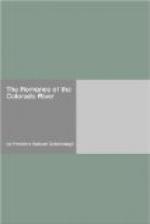For 149 miles the easy waters of Glen Canyon bore them along, and by August 4th they had passed the Crossing of the Fathers, or Ute Ford, as it was called in that country before its identification as the point where Escalante crossed, and were at the mouth of the Paria, since 1873 better known as Lee’s Ferry. They had now before them the grandest of all the gorges, though only two hundred feet deep at the beginning; but they had not proceeded far into it before the walls ran rapidly up while the river ran rapidly down. Numerous falls appeared, one following another in quick succession, necessitating portages and much hard work. When Powell managed to climb out on the 7th, the walls had grown to twenty-three hundred feet. They soon increased to about thirty-five hundred feet, often vertical on one or the other side at the water, and even in the upper portions extremely precipitous. By the l0th they had reached the mouth of the Little Colorado, where White’s imagination had pictured the greatest terror of the whole river, and the end of all the dangerous part. The walls of this tributary are, as is usually the case, the same as those of the main gorge, but the stream itself was small, muddy, and saline. Powell walked up it three or four miles, having no trouble in crossing it by wading when desirable. He called the new gorge now before him, really only a continuation of the one ending with the canyon of the Little Colorado, the “Great Unknown,” and a party some twenty years later, emulating the early Spaniards in the art of forgetting, called it the same, but it was the Great Unknown only once, and that was when Powell on this occasion first faced the sublime, unfathomed depths that here lay in his course. Only one month’s rations remained as a reliance in this terrible passage. Powell says: “We have an unknown distance yet to run; an unknown river yet to explore. What falls there are we know not; what rocks beset the channel, we know not; what walk rise over the river, we know not. . . . The men talk as cheerfully as ever; jests are bandied about freely this morning; but to me the cheer is sombre and the jests are ghastly.” With anxiety




